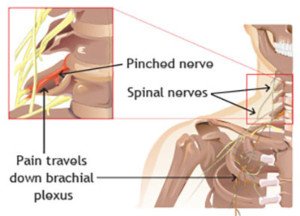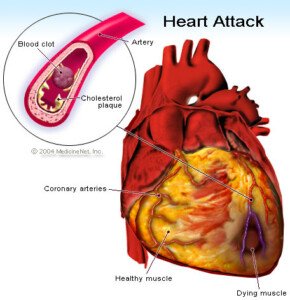
There are distinctions in the shoulder pain from a heart attack vs. a pinched nerve in the neck.
But does this mean you can self-diagnose?
Shoulder pain from a heart attack can come on fairly suddenly, but so can pain caused by a pinched nerve in the neck (cervical vertebrae).
Biggest Difference Between Heart Attack Shoulder Pain & Pinched Nerve
Shoulder pain from a heart attack in progress (or very imminent one) will likely be accompanied by other key symptoms — either all, some or one other:
• Pain, squeezing, crushing or a vice-like sensation in the chest
• Feeling like you can’t get enough oxygen, shortness of breath, being winded even while at rest
• Nausea or upchucking
• Clammy cold and/or sweaty skin
• Lightheadedness, faint feeling
• Jaw pain
• Upper back pain, arm pain
A pinched nerve in the neck, though quite capable of causing a lot of shoulder pain, will not cause a feeling of being out of breath, shortness of breath, nausea/vomiting, breaking into a sweat, feeling faint, or pain in the chest or jaw.

What if a heart attack is causing just one symptom: shoulder pain?
A hallmark difference between heart attack shoulder pain and benign shoulder pain is that in the case of a cardiac event, the pain does NOT change with body position.
Shoulder pain from a pinched, compressed or irritated nerve that branches out of the spinal cord at the neck level will often fluctuate with body position.
“A pinched nerve can occur in the shoulder region in a defined area known as the thoracic outlet,” says Eugene Charles, DC, Diplomate of applied kinesiology and author of “Journey to Healing: The Art and Science of Applied Kinesiology.”
“The thoracic outlet is a narrow space between the collarbone and first rib located near your lower neck and upper chest where blood vessels, nerves and muscles pass through.
“It is surrounded by the neck flexor, upper trapezius and pectoral muscles. When this ‘pinching’ occurs, it’s known as thoracic outlet syndrome (TOS).
“When this happens on your left side it’s often confused with a heart attack (which you should go to the ER and rule out first).
“TOS differs from a heart attack in that these symptoms last longer and are affected by movement — meaning, if you slouch the symptoms intensify, and when you stretch out they dissipate.”
Furthermore, shoulder pain from a pinched nerve often comes with tingling, a “pins and needles” feeling, numbness and/or weakness down the arm, and/or these same symptoms in the hand or fingers.
These symptoms may come and go, and seem to correlate with body positions, whereas shoulder pain from a heart attack will not come and go with a change in body position.
There’s often some kind of pain in the neck and/or arm if there’s shoulder pain from a cervical nerve problem.
It’s usually a burning or sharp sensation. Some patients report that the pain is agonizing. Shoulder pain from a heart problem is not agonizing.
Shoulder pain from either a heart attack or a neck nerve issue often radiates or spreads down the arm.
This is what’s so scary, especially if there’s no numbness, tingling or “pins and needles” feeling present – AND especially if there’s jaw and/or chest pain!
“Let me start off by saying that this is NOT an area where self-diagnosis is a good idea,” says Roger Mills, MD, cardiologist and former professor of medicine, University of Florida, and author of “240 Beats per Minute. Life with an Unruly Heart.”
“If there’s a serious question in your mind, best to let a qualified medical professional evaluate the symptoms,” continues Dr. Mills.
“Second, my concern is not so much heart attack pain but the intermittent exertional discomfort called angina that signals a blood supply-demand mismatch in the heart.
“Angina is not always ‘chest pain,’ and chest pain is not always angina.
“Patients may sense the discomfort of angina in the shoulder (left or right), in the neck or jaw, or in the upper abdomen.
“The characteristic features of angina are that the discomfort comes on with exercise and is relieved by rest, and it is often associated with some sense of pressure or shortness of breath.
“In contrast, the sharp radiating pain from nerve root irritation may occur at rest, or with certain specific changes in position.
“The typical description [from a patient] is, ‘It hurts when I do this’ accompanied by a turn of the head or change in posture.”
What should you do?
“If you are experiencing a heart attack, time is heart muscle,” says Dr. Mills.

“Most medical centers in the U.S. now have programs that can significantly reduce the damage to your heart.
“Don’t sit at home and wait to see if it goes away.”
Though you may believe that the shoulder pain is from a recent incident in the gym, Dr. Charles advises,“When this occurs on your left side it can often mimic a heart attack. As a precautionary measure, you should immediately go to the ER and make sure it is not.
“Once cleared, you can go to your physical medicine specialist, such as a doctor of chiropractic or osteopathy, and be examined to see if your symptoms are from TOC.”
A trip to the ER will get you a blood test that can show if you had a heart attack.
A heart attack damages cardiac muscle, releasing a protein into the bloodstream which will be detected by the blood test.
If you’re cleared from having had a heart attack, you may be also be advised to see a neurosurgeon who specializes in the treatment of pinched nerves.
An MRI will show nerve compression in the neck.
Dr. Charles has helped thousands of patients and taught over 1,200 doctors during his 30+ years of practice. He has also created the Power Kinetics® Exercise Program and line of nutritional vitamins and performance supplements. amazon.com/Journey-Healing-Science-Applied-Kinesiology/dp/0964421763











































